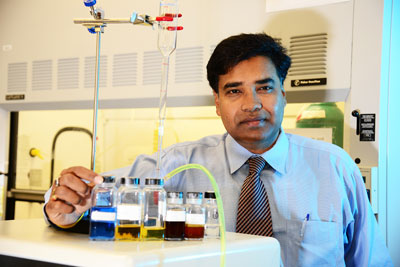 The University of Central Florida's NanoScience Center is developing a new program to make a graphene-based spray coating that would help multiple industries easily and inexpensively fight corrosion.
The University of Central Florida's NanoScience Center is developing a new program to make a graphene-based spray coating that would help multiple industries easily and inexpensively fight corrosion.
Jan 28th, 2014
Read more
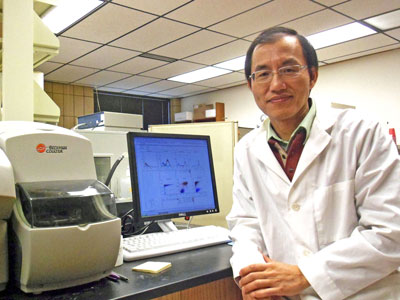 Scientists have been systematically studying the effects of transition metal oxide nanoparticles on human lung cells. These nanoparticles are used extensively in optical and recording devices, water purification systems, cosmetics and skin care products, and targeted drug delivery, among other applications.
Scientists have been systematically studying the effects of transition metal oxide nanoparticles on human lung cells. These nanoparticles are used extensively in optical and recording devices, water purification systems, cosmetics and skin care products, and targeted drug delivery, among other applications.
Jan 28th, 2014
Read more
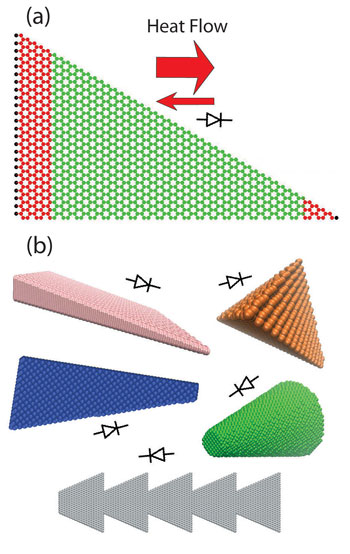 Researchers are proposing a new technology that might control the flow of heat the way electronic devices control electrical current, an advance that could have applications in a diverse range of fields from electronics to textiles.
Researchers are proposing a new technology that might control the flow of heat the way electronic devices control electrical current, an advance that could have applications in a diverse range of fields from electronics to textiles.
Jan 28th, 2014
Read more
University of Houston researchers have developed a new stretchable and transparent electrical conductor, bringing the potential for a fully foldable cell phone or a flat-screen television that can be folded and carried under your arm closer to reality.
Jan 28th, 2014
Read more
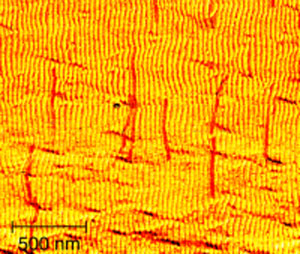 Da die anhaltende Miniaturisierung elektronischer Bauelemente bald an ihre physikalischen Grenzen st��t, suchen Forscher nach neuen Herstellungsmethoden. Einen aussichtsreichen Ansatz liefert DNA-Origami, bei dem sich Einzelstr�nge des Biomolek�ls selbstst�ndig zu beliebig geformten Nanostrukturen zusammenfinden.
Da die anhaltende Miniaturisierung elektronischer Bauelemente bald an ihre physikalischen Grenzen st��t, suchen Forscher nach neuen Herstellungsmethoden. Einen aussichtsreichen Ansatz liefert DNA-Origami, bei dem sich Einzelstr�nge des Biomolek�ls selbstst�ndig zu beliebig geformten Nanostrukturen zusammenfinden.
Jan 28th, 2014
Read more
Japan's National Institute for Materials Science (NIMS) and the Swiss Federal Laboratories for Materials Science and Technology (Empa) have signed a 5-year collaborative agreement to co-publish the open access journal Science and Technology of Advanced Materials (STAM). Their goal is to make STAM one of the world's leading publications in materials science.
Jan 28th, 2014
Read more
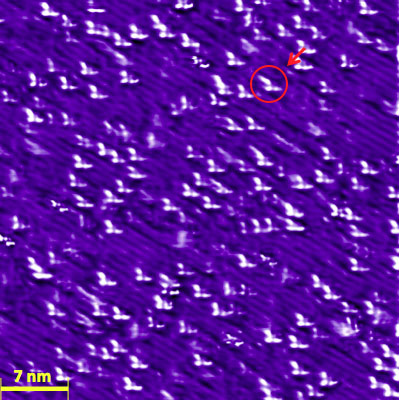 Nearly 30 years after the discovery of high-temperature superconductivity, many questions remain, but an Oak Ridge National Laboratory team is providing insight that could lead to better superconductors.
Nearly 30 years after the discovery of high-temperature superconductivity, many questions remain, but an Oak Ridge National Laboratory team is providing insight that could lead to better superconductors.
Jan 27th, 2014
Read more
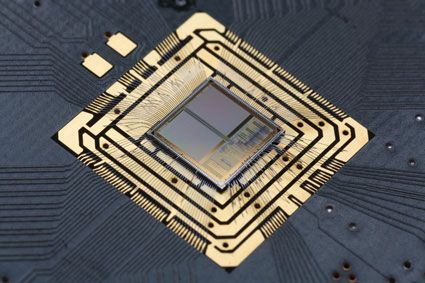 Scientists from Berlin and Heidelberg use artifical nerve cells to classify different types of data. Thus, they may recognize handwritten numbers, or distinguish plant species based on their flowers.
Scientists from Berlin and Heidelberg use artifical nerve cells to classify different types of data. Thus, they may recognize handwritten numbers, or distinguish plant species based on their flowers.
Jan 27th, 2014
Read more
A team of researchers at the University of Toronto has discovered a method of assembling "building blocks" of gold nanoparticles as the vehicle to deliver cancer medications or cancer-identifying markers directly into cancerous tumors.
Jan 27th, 2014
Read more
An interdisciplinary team of scientists and engineers from The MITRE Corporation and Harvard University have taken key steps toward ultra-small electronic computer systems that push beyond the imminent end of Moore's Law, which states that the device density and overall processing power for computers will double every two to three years.
Jan 27th, 2014
Read more
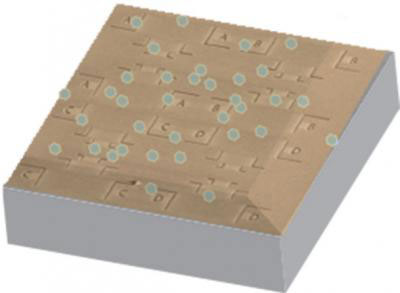 Silk and diamonds aren't just for ties and jewelry anymore. They're ingredients for a new kind of tiny glowing particle that could provide doctors and researchers with a novel technique for biological imaging and drug delivery.
Silk and diamonds aren't just for ties and jewelry anymore. They're ingredients for a new kind of tiny glowing particle that could provide doctors and researchers with a novel technique for biological imaging and drug delivery.
Jan 27th, 2014
Read more
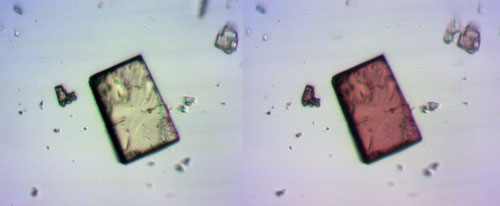 The sponges of the future will do more than clean house. Delivering drugs and trapping gases are all potential applications. That's what chemist Jason Benedict had in mind when he led the design of a new, porous material whose pores change shape in response to ultraviolet light.
The sponges of the future will do more than clean house. Delivering drugs and trapping gases are all potential applications. That's what chemist Jason Benedict had in mind when he led the design of a new, porous material whose pores change shape in response to ultraviolet light.
Jan 27th, 2014
Read more
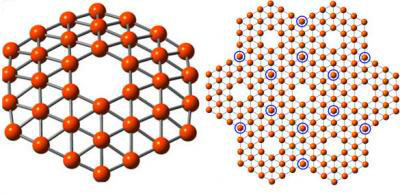 Researchers from Brown University have shown experimentally that a boron-based competitor to graphene is a very real possibility.
Researchers from Brown University have shown experimentally that a boron-based competitor to graphene is a very real possibility.
Jan 27th, 2014
Read more
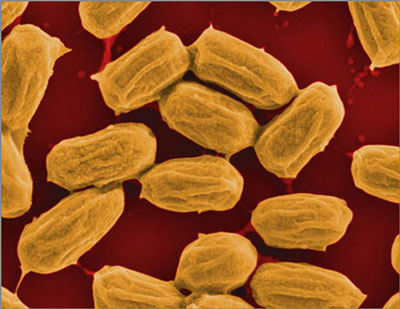 A new type of electrical generator uses bacterial spores to harness the untapped power of evaporating water, according to research conducted at the Wyss Institute of Biologically Inspired Engineering at Harvard University. Its developers foresee electrical generators driven by changes in humidity from sun-warmed ponds and harbors.
A new type of electrical generator uses bacterial spores to harness the untapped power of evaporating water, according to research conducted at the Wyss Institute of Biologically Inspired Engineering at Harvard University. Its developers foresee electrical generators driven by changes in humidity from sun-warmed ponds and harbors.
Jan 27th, 2014
Read more
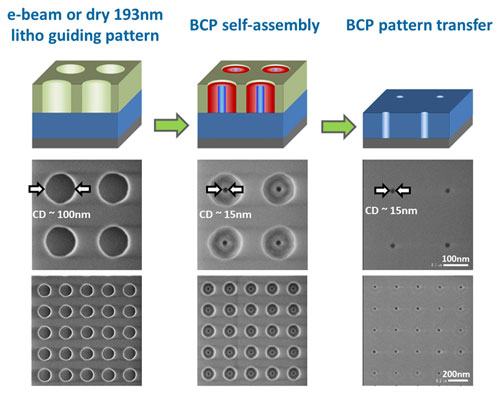 European research consortium to develop simulation tools, materials and processes to enable further miniaturization of nanoelectronics
European research consortium to develop simulation tools, materials and processes to enable further miniaturization of nanoelectronics
Jan 27th, 2014
Read more
For the first time ever, scientists have managed to move single atoms vertically inside a crystal. This is important for the further development of nanostructures. Simultaneously, the physicists found a method for measuring a transistor-like behaviour of single atoms.
Jan 27th, 2014
Read more
 The University of Central Florida's NanoScience Center is developing a new program to make a graphene-based spray coating that would help multiple industries easily and inexpensively fight corrosion.
The University of Central Florida's NanoScience Center is developing a new program to make a graphene-based spray coating that would help multiple industries easily and inexpensively fight corrosion.










 Subscribe to our Nanotechnology News feed
Subscribe to our Nanotechnology News feed